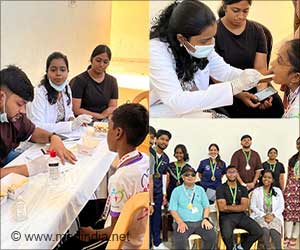The men living in the tough Baseco dockside shantytown on Manila Bay carry one of two badges to prove they belong -- tattoos for the gang members and surgical scars for the kidney sellers.
Built on muck dredged from the bay on the orders of former first lady Imelda Marcos for a visit by Britain's Queen Elizabeth, who never came, the 52-hectare (128-acre) open garbage dump is a grim reminder of the desperate poverty of the Philippines.Few escape from the ranks of the largely unskilled and poorly educated settlers who arrive by ferry from other islands to hire themselves out as stevedores and porters.
When things get bad the men sell their blood.
And when all seems lost many resort to selling an organ.
"I was paid 160,000 pesos (3,848 dollars)," said Joey Rosco, 38. A curved, 13-inch scar running along his left side from below his ribcage to his hip is the only evidence of the 1991 surgery.
"The money is long gone now, and I am still poor," the father of five with a tattoo of a woman's face on his right bicep tells AFP outside his cramped hut of plywood, bamboo and tin sheets.
Advertisement
He says a neighbour and fellow donor died from complications seven years after undergoing the same procedure, while a third donor accidentally killed his pregnant wife after using the money he earned from selling his kidney to buy a handgun.
Advertisement
"Between 2002 and 2005, when a 10 percent cap for transplants to foreigners was supposed to have been enforced, more than 400 kidney transplants from local donors to foreign recipients were performed," said society president Lyn Gomez.
She added, however, that "incomplete reporting from some hospitals" meant that the actual number of operations was likely to be much higher.
A total of 436 kidney transplants from unrelated, living donors were performed in 2006 in 24 Philippine hospitals, according to the government's Renal Disease Control Programme.
In the same period there were 36 transplants from deceased donors.
Baseco is the best-known living donor community, with local officials estimating that some 3,000 of the slum's 50,000 residents have sold a kidney.
"I never met anyone who got rich selling a kidney" --
Filipino Roman Catholic bishops in January denounced as "morally unacceptable" the organ trade which they said exploited the poor.
"The kidney trade has been here since the 1970s," said Baseco village chief Kristo Hispano.
"They say they resorted to it because they couldn't find a job or needed money to put up a business. But I have yet to meet a person who got rich using his kidney as capital."
Before he sold his kidney in 1991, Rosco said he had been regularly selling his blood for 35 pesos (84 US cents) a litre at Manila's commercial blood banks.
The Filipino nephrologists recently discovered that a number of depressed towns near Manila, including Calauag, Gumaca, Lopez, and Sariaya, are home to hundreds of farmers, tricycle drivers, uneducated or unemployed men who had sold a kidney.
Some had been paid as little as 20,000 pesos (481 dollars) "plus a grocery package and some medication," but never received post-surgical care, said renal specialist Benita Padilla, who conducted the study.
Some now suffer from high blood pressure or renal disorders themselves.
The World Health Organisation's guiding principles on organ transplants prescribe harvesting from the dead, while living donors "should be genetically related to recipients".
Selling or exporting human organs is punishable in the Philippines by jail terms of at least 20 years plus stiff fines, but few traffickers have been prosecuted, said Amihan Abueva, a Manila-based anti-human trafficking advocate.
She said the organ networks operate in a grey area where the patients get "donations" from non-relatives.
The Philippines has only 21 kidney transplant surgeons, the health department said. Organ transfers from live donors cater mostly to wealthy foreigners, many of them from the Middle East, the nephrologists said.
The surgeons run their own networks of agents who offer prospective donors a way out of poverty.
In spite of this huge potential donor pool, the health department says fewer than a thousand people a year of an estimated 10,000 Filipinos whose kidneys fail receive transplants.
In a country where a third of the population lives on a dollar a day or less, few can afford to pay at least 17,000 dollars, even though the alternative -- dialysis -- is equally costly.
"We cannot impose on donors. We are just an administrative agency," said health undersecretary Alexander Padilla, a member of a government team that drafted a new national policy on kidney transplants.
The government has temporarily suspended transplants from living non-related donors under pain of licence cancellations for hospitals and surgeons.
He said health officials and representatives from the medical professions are drafting new guidelines for these transplants, which he said may or may not ban transplants to foreigners in the future.
Source-AFP
SRM/L










